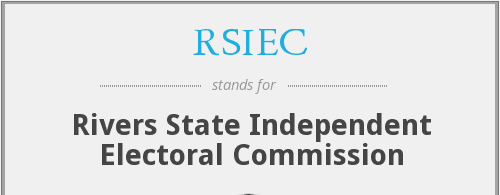Editorial
LG Polls: Kudos To RSIEC

April 17, 2021 local government election conducted by the Rivers State Independent Electoral Commission (RSIEC) has come and gone. All indications were that the polls were successfully concluded across the 23 local government areas of the state. In the results announced by RSIEC 24 hours after the election, the Peoples Democratic Party (PDP) won all the chairmanship and councillorship positions. We congratulate the PDP on their victory.
It was reported that the state recorded a peaceful, credible and transparent election. And that is a demonstration of Governor Nyesom Wike’s commitment to deepening democracy in the country. The governor has always been an advocate of credible and transparent conduct of elections in our nation. The sincerity of his advocacy was witnessed in the just-concluded Rivers local government elections.
RSIEC is commended for conducting a free, fair, credible and peaceful local government election in all the 23 local government councils of the state. The distribution of election materials, accreditation of voters, counting and recording of votes were carried out transparently. The security agencies also acted professionally before, during and after the election. They deserve approbation.
Though there was initial tension and thinking that the results would be doctored, it all turned out to be a farce. All the results declared by the electoral umpire were the same as announced at the various polling units. This is what we wish for the state in particular and the country in general – an electoral process where the people will choose their leaders by their votes, not by coercion.
It is heart-warming that voters expressed so much confidence in the electoral process to the point that even when RSIEC officials arrived late with their materials at some polling units, many voters who had earlier reported at such polling units but left because of the absence of both officials and materials, returned to vote on sighting electoral officers.
Also, the electorate peacefully organised themselves by casting their votes for the candidates of their choice at the various polling units. The electoral commission attributed the peaceful and successful conduct of the elections to adequate security and orderly behaviour of the electorate. Similarly, the candidates of all the parties and their agents are lauded for their peaceful and orderly disposition while participating in the exercise.
Some stakeholders have attributed the peaceful atmosphere of the election to the non-participation of the All Progressives Congress (APC) in the poll. We agree no less with that view. Truly, if the APC had participated, they would have coerced security agencies and done all manner of negative things like instructing cultists or even security agents to shoot at voters as well as hiring thugs to do away with ballot boxes.
The message to the Independent National Electoral Commission (INEC) is that they could conduct credible elections if they resist pressures from different quarters. Indeed, INEC can be committed to doing the right thing. The federal electoral body should build confidence and borrow a leaf from RSIEC. Every other thing will move on smoothly and our democracy will be better for it.
Following the successful poll, a deluge of commendations has continued to trail RSIEC. Stakeholders in the state are united in describing the election as credible, free, fair and transparent. Those who expressed satisfaction with the commission’s handling of the election include the Inter-Party Advisory Council (IPAC) and Labour Party, among others. IPAC declared that the outcome of the poll was fair and credible.
The result of this election has come as a surprise to critics of the Wike administration as they thought violence and intimidations would disrupt the ballot. We urge RSIEC to build on this success in subsequent elections as its continued credibility is key to the success or outcome of elections in the state. The state electoral body may wish to embark on early preparations as well as plugging identified loopholes in future elections.
Again, the aftermath of the election was a sign that RSIEC had been listening to the cries of Rivers people. Even though there were a few reports of ballot box snatching, intimidation, thumbprinting of ballot papers and pockets of violence as well as buying of votes, the election was far much better than others conducted by INEC under the present APC government.
Having been voted for, it is expected that the elected council officials will deliver dividends of democracy in their respective local government areas. They must desist from abusing the opportunity they have been given to serve the people at the grassroots. The craving for money that characterises the conduct of political office holders at the grassroots must be shunned.
The newly-elected local government officials should be responsible and responsive to the needs of their people. They have to interact with their subjects, identify their problems and solve them. After all, that is why they were elected in the first place. For the elected chairmen to succeed, they have to work in synergy with their deputies and councillors. This will check unnecessary bickering among them that may result in poor governance of the councils.
On the whole, we congratulate all the elected chairmen and councillors across the state. We urge those who are dissatisfied with the outcome of the poll to seek redress in the court of law where justice is expected to be served and stop vilifying an election that has been adjudged free and fair by the good people of Rivers State.
Editorial
Benue Killings: Beyond Tinubu’s Visit

The recent massacre in Yelewata, Benue State, ranks among Nigeria’s deadliest attacks of
2025. While official figures put the death toll at 59, media reports and Amnesty International estimate between 100 and 200 fatalities. This atrocity extends a decade-long pattern of violence in Nigeria’s Middle Belt, where Beacon Security data records 1,043 deaths in Benue alone between May 2023 and May 2025.
President Tinubu’s visit on 18 June—four days after the 14 June attack—has drawn sharp criticism for its lateness. This delay echoes a history of inadequate responses, with Human Rights Watch documenting similar inaction in Plateau and Kaduna states since 2013, fuelling a culture of impunity. The attack lasted over two hours without meaningful security intervention, despite claims of swift action.
The violence bore hallmarks of genocide, with survivors recounting systematic house burnings and executions. More than 2.2 million people have been displaced in the region since 2019 due to comparable attacks. Data show Benue’s agricultural output falls by 0.21 per cent in crops and 0.31 per cent in livestock for every 1 per cent rise in violence.
Security forces continue to underperform. No arrests were made following the Easter attacks in April (56 killed) or May’s Gwer West massacre (42 killed). During his visit, Tinubu questioned publicly why no suspects had been detained four days after Yelewata, highlighting entrenched accountability failures.
The roots of the conflict are complex, with climate change pushing northern herders south and 77 per cent of Benue’s population reliant on agriculture. A Tiv community leader described the violence as “calculated land-grabbing” rather than mere clashes, with over 500 deaths recorded since 2019.
Government interventions have largely fallen short. The 2018 federal task force and 2025 Forest Guards initiative failed to curb violence. Tinubu’s newly announced committee of ex-governors and traditional rulers has been met with scepticism given the litany of past unkept promises.
The economic fallout is severe. Benue’s status as Nigeria’s “food basket” is crumbling as farms are destroyed and farmers displaced. This worsens the nation’s food crisis, with hunger surges in 2023-2024 directly linked to farming disruptions caused by insecurity.
Citizens demanding justice have been met with force; protesters faced police tear gas, and the State Assembly conceded total failure in safeguarding lives, admitting that the governor, deputy, and 32 lawmakers had all neglected their constitutional responsibilities.
The massacre has drawn international condemnation. Pope Leo XIV decried the “terrible massacre,” while the UN called for an investigation. The hashtag “200 Nigerians” trended worldwide on X, with many contrasting Nigeria’s slow response to India’s swift action following a plane crash with similar fatalities.
Nigeria’s centralised security system is clearly overwhelmed. A single police force is tasked with covering 36 states and 774 local government areas for a population exceeding 200 million. Between 2021 and 2023 alone, 29,828 killings and 15,404 kidnappings were recorded nationally. Proposals for state police, floated since January 2025, remain stalled.
Other populous nations offer alternative models. Canada’s provincial police, India’s state forces, and Indonesia’s municipal units demonstrate the effectiveness of decentralised policing. Nigeria’s centralised structure creates intelligence and response gaps, worsened by the distance—both physical and bureaucratic—from Abuja to affected communities.
The immediate aftermath is dire: 21 IDP camps in Benue are overwhelmed, and a humanitarian crisis is deepening. The State Assembly declared three days of mourning (18-20 June), but survivors lack sufficient medical aid. Tragically, many of those killed were already displaced by earlier violence.
A lasting solution requires a multi-pronged approach, including targeted security deployment, regulated grazing land, and full enforcement of Benue’s 2017 Anti-Open Grazing Law. The National Economic Council’s failure to prioritise state police in May 2025 represents a missed chance for reform.
Without decisive intervention, trends suggest conditions will worsen. More than 20,000 Nigerians have been killed and 13,000 kidnapped nationwide in 2025 alone. As Governor Hyacinth Alia stressed during Tinubu’s visit, state police may be the only viable path forward. All 36 states have submitted proposals supporting decentralisation—a crucial step towards breaking Nigeria’s vicious cycle of violence.
Editorial
Responding To Herders’ Threat In Rivers

Editorial
Democracy Day: So Far…

Nigeria’s return to democratic rule in 1999 marked a watershed moment in the nation’s political history. After enduring nearly 16 years of successive military dictatorships, Nigerians embraced a new era of civil governance with the inauguration of President Olusegun Obasanjo on May 29, 1999. Since then, the country has sustained a democratic system for 26 years. But, this democratic journey has been a complex mix of progress and persistent challenges.
The formal recognition of June 12 as Democracy Day in 2018 by former President Muhammadu Buhari acknowledged a long-standing injustice. The annulment of the 1993 presidential election, Nigeria’s freest, betrayed the democratic aspirations of millions. That it took decades to honour this date reflects the nation’s complex relationship with its democratic memory.
One of the most momentous successes of Nigeria’s democracy has been the uninterrupted civilian rule over the last two and a half decades. The country has witnessed seven general elections, with power transferring peacefully among different political parties. This is particularly notable considering that prior to 1999, no civilian government had completed a full term without military intervention. The peaceful transitions in 2007, 2015, and 2023 are testaments to Nigeria’s evolving democratic maturity.
Electoral participation, while uneven, has also reflected a level of democratic engagement. In 2003, voter turnout stood at about 69 per cent, but this figure dropped to approximately 34.75 per cent in 2023, according to the Independent National Electoral Commission (INEC). Although the declining turnout raises concerns, it also highlights the increasing expectations of the electorate, who demand credible and transparent elections.
Another area of progress is the growth of a vibrant and free press. Nigerian media has played a crucial role in holding governments accountable and fostering public discourse. Investigative journalism and civil society activism have exposed corruption and human rights abuses. The rise of social media has further expanded the democratic space, enabling young Nigerians to mobilise and advocate for change, as evidenced by the 2020 #EndSARS protests.
Judicial independence has seen mixed results. On one hand, the judiciary has occasionally demonstrated resilience, such as in landmark rulings that overturned fraudulent elections or curtailed executive excesses. On the other hand, allegations of political interference and corruption within the judiciary persist, undermining public confidence in the legal system’s impartiality.
Nigeria’s democracy has also facilitated the decentralisation of power through the federal system. State governments now wield some autonomy, allowing for experimentation in governance and service delivery. While this has led to innovative policies in some states, it has also entrenched patronage networks and uneven development across the federation.
Despite these successes, Nigeria’s democratic journey faces formidable problems. Electoral integrity remains a critical concern. Reports from election observers, including those from the European Union and ECOWAS, frequently highlight issues such as vote-buying, ballot box snatching, and violence. The introduction of the Bimodal Voter Accreditation System (BVAS) and electronic transmission of results in 2023 elections showed promise, but technical glitches and alleged manipulations dampened public trust.
Corruption continues to be a pervasive issue. Nigeria ranks 145th out of 180 countries on Transparency International’s 2023 Corruption Perceptions Index, with a score of 25/100. Democratic institutions meant to check graft—such as anti-corruption agencies and the legislature—often struggle due to political interference and weak enforcement mechanisms.
Security challenges have also strained Nigeria’s democracy. Insurgency in the North East, banditry in the North West, separatist agitations in the South East, and herder-farmer conflicts across the Middle Belt have collectively resulted in thousands of deaths and displacements. According to the Global Terrorism Index 2024, Nigeria ranks as the eighth most impacted country by terrorism. The government’s difficulty in ensuring safety erodes public confidence in the state’s capacity and legitimacy.
The economy poses another critical remonstrance. Nigeria’s Gross Domestic Product (GDP) per capita stands at approximately $2,400 as of 2024, with over 40 per cent of the population living below the national poverty line. High unemployment and inflation have fueled discontent and disillusionment with democratic governance, especially among youth. Without addressing economic grievances, the democratic dividend will remain elusive for many Nigerians.
Ethnic and religious divisions further complicate Nigeria’s democratic consolidation. Politicians often exploit identity politics for electoral gains, exacerbating social tensions. Although federal character principles aim to promote inclusiveness, they have also sometimes fostered a quota mentality rather than merit-based appointments.
Gender representation remains inadequate in Nigeria’s democratic institutions. Women occupy less than 10 per cent of seats in the National Assembly, one of the lowest rates globally. Efforts to pass gender parity bills have faced stiff resistance, highlighting deep-seated cultural and institutional barriers to female political participation.
Civil liberties, while constitutionally guaranteed, are under threat. Crackdowns on protesters, restrictions on press freedom, and surveillance of activists reveal an authoritarian streak within the democratic framework. The controversial Twitter ban in 2021 exemplified the country’s willingness to curb digital freedoms, prompting domestic and international criticism.
The political crisis in Rivers State embodies broader democratic struggles. Attempts to control the state through undemocratic means expose weaknesses in federal institutions and the rule of law. Immediate restoration of democratic governance in Rivers State is vital to preserving Nigeria’s democratic integrity and institutional credibility.
Local governments remain under the control of state governors, depriving citizens of grassroots democracy. Last year’s Supreme Court judgment on local government autonomy is promising, but state-level resistance threatens its implementation. Genuine autonomy would bring governance closer to the people and foster democratic innovation.
As we mark Democracy Day, we must honour the sacrifices of Chief M.K.O. Abiola, Kudirat Abiola, Femi Falana, Chief Gani Fawehinmi, Pa Alfred Rewane, President Bola Tinubu, and countless others, who fought for Nigeria’s freedom. As democracy in Nigeria continues to evolve after 26 years, this day should inspire action toward its renewal. With despotism and state failure as real threats, both citizens and leaders must take responsibility—citizens by demanding more, and leaders by delivering. Excuses are no longer acceptable.
-

 News3 days ago
News3 days agoCourt Sentences Gospel Singer To Death For Killing Girlfriend In Nasarawa
-

 Politics3 days ago
Politics3 days agoMakinde Renames Polytechnic After Late Ex-Gov
-
Sports4 days ago
Olympic Day Sparks Nationwide Fitness Fever
-

 Nation3 days ago
Nation3 days agoOgoni Stakeholders Hail Zabbey’s Performance
-
Sports4 days ago
I Joined Saudi League To Win Titles – Senegal Keeper
-

 Niger Delta3 days ago
Niger Delta3 days agoOBALGA Sole Administrator Presents Brand New Fire Extinguishers To Council …Commiserates With Traders Over Rumuomasi Market Fire Incident …Commences Desilting Of Drainages
-

 News3 days ago
News3 days agoWDD: Tinubu Seeks Global Action On Drug Abuse
-

 Featured3 days ago
Featured3 days agoTinubu Signs Four Tax Reform Bills Into Law …Says Nigeria Open For Business

